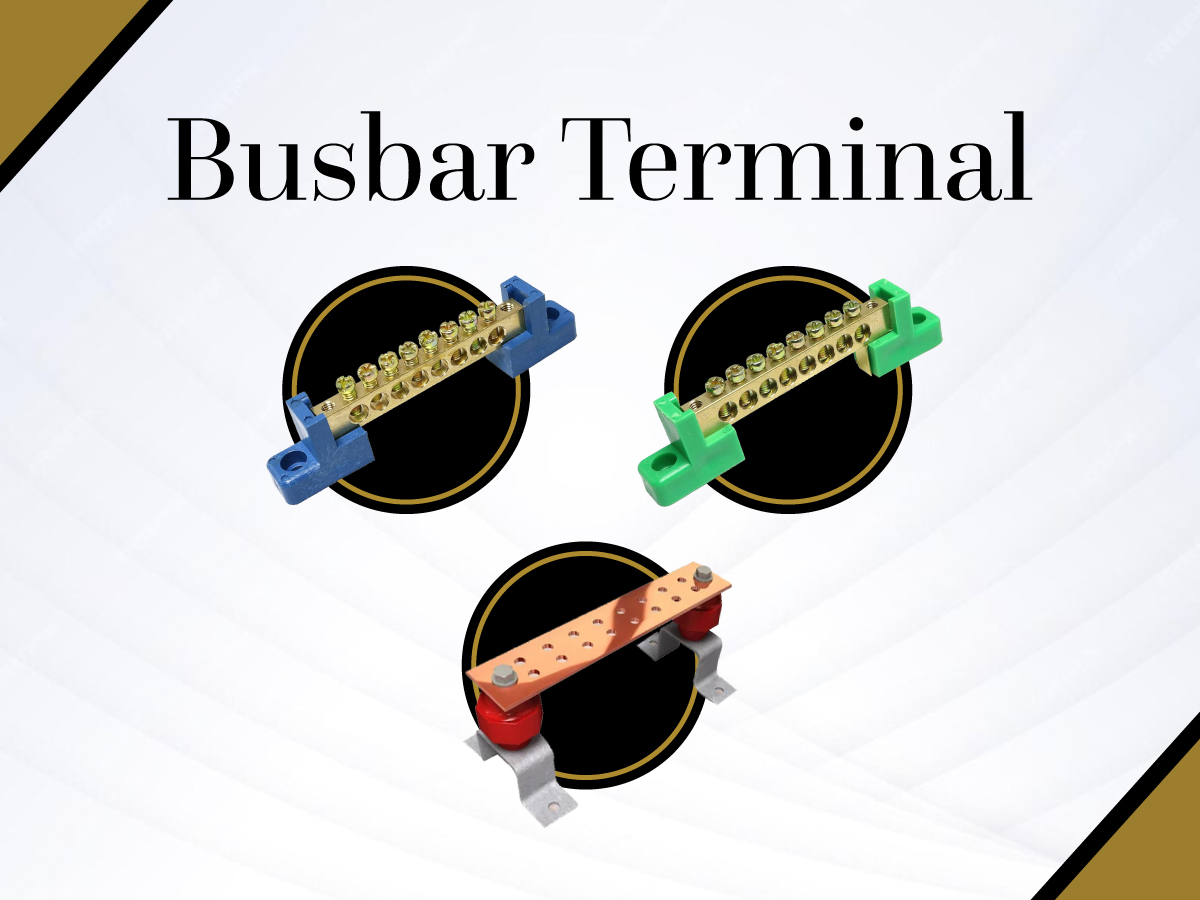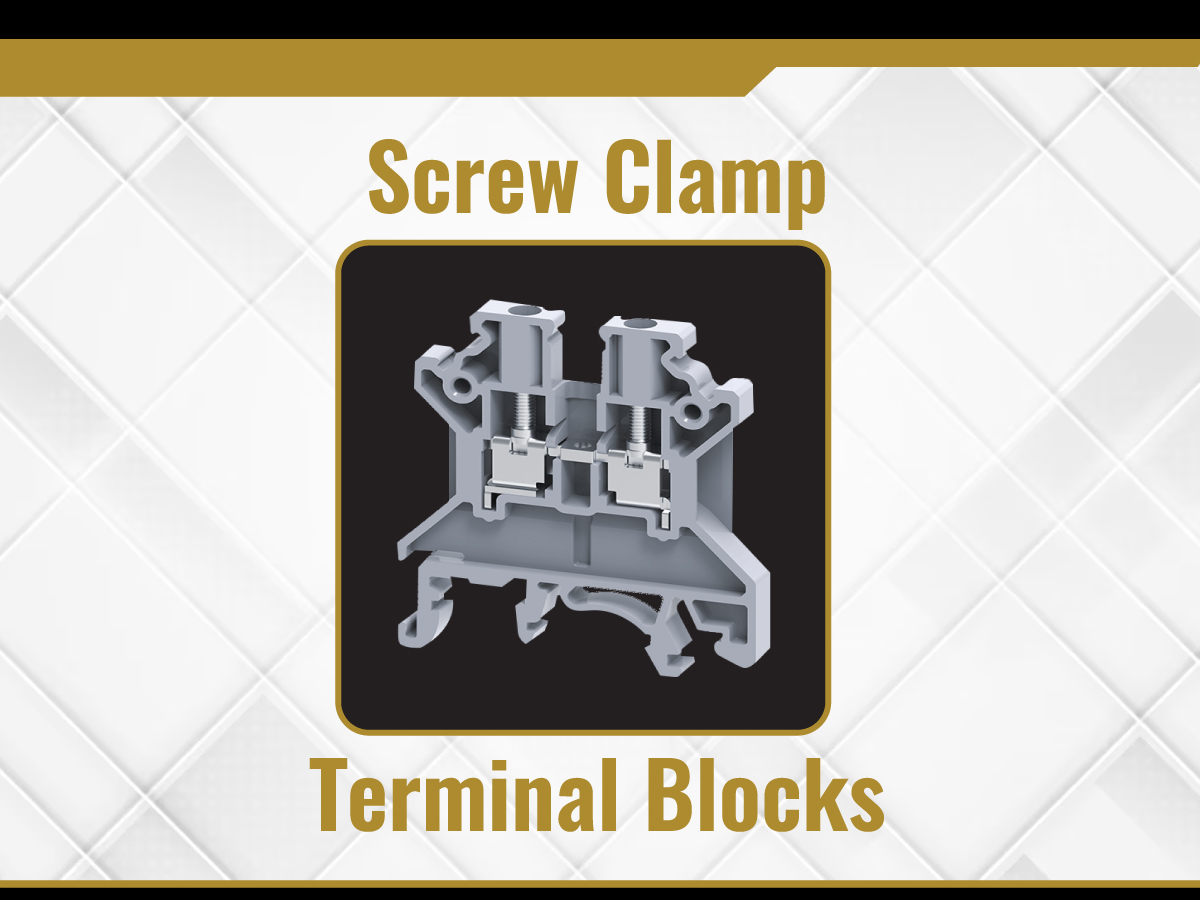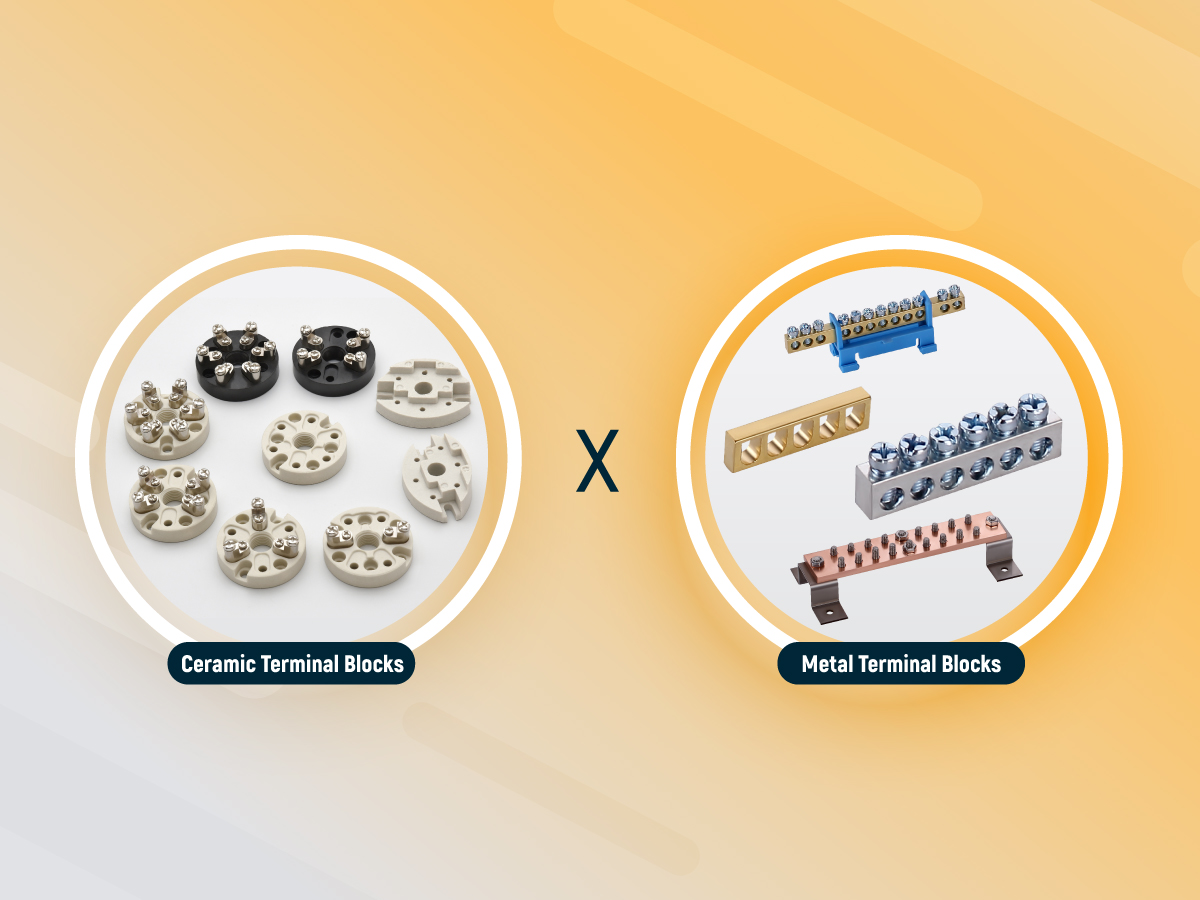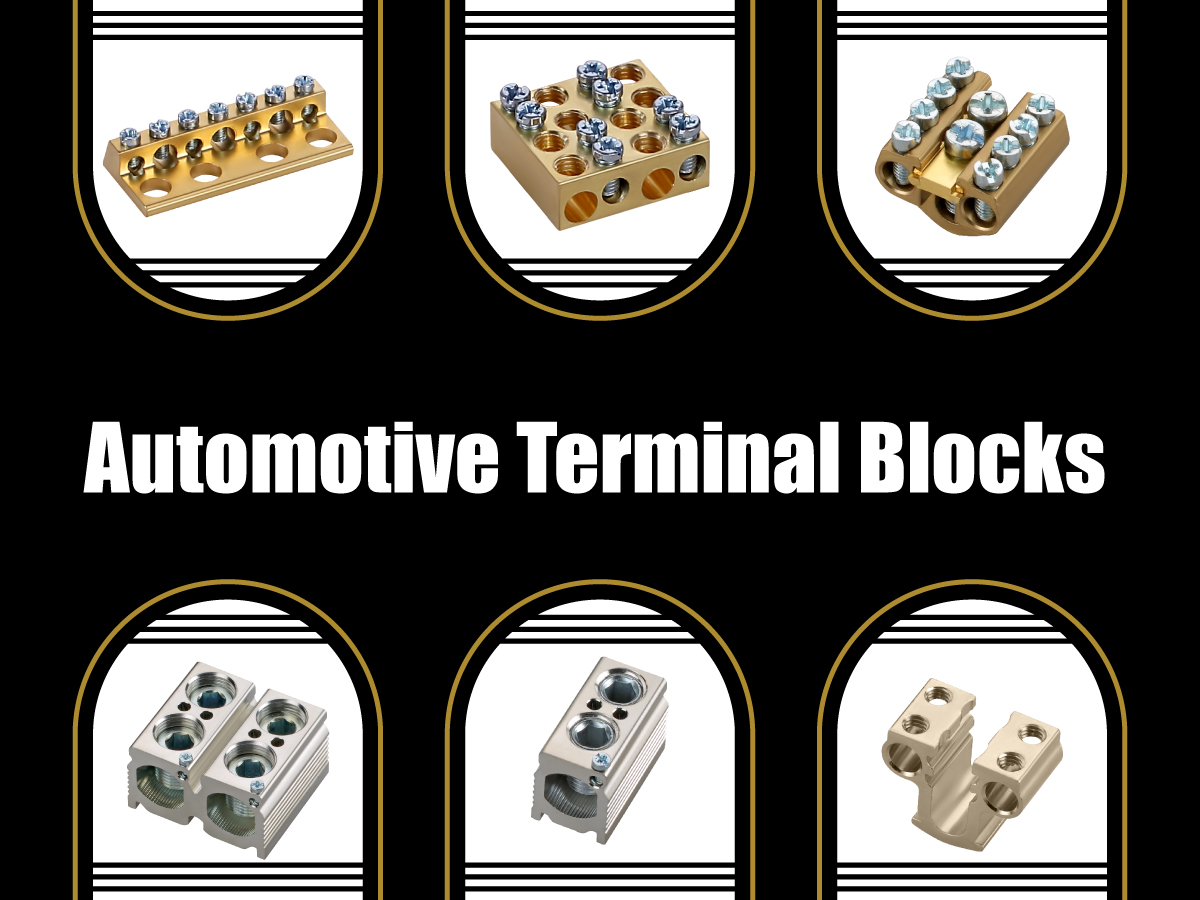- Home >
- category >
- Terminal Blocks >
Teron Metal Components News & Events
Explore the latest blog and news on metal components, electrical components, earthing components, fasteners, custom manufacturing solutions, industrial solutions, latest industrial trends, and more!
Categories
Archives
Enhance industrial electrical connections with high-performance busbar terminals!

In today’s fast-paced industrial and commercial sectors, reliable electrical connections are essential for efficiency, safety, and performance. Teron Metal Components brings you high-performance busbar terminals designed to enhance conductivity, durability, and ease of installation. Engineered with precision and manufactured using top-quality materials, our busbar terminals ensure optimal power distribution while minimizing energy loss and maintenance costs. Whether you’re upgrading an existing system or building a new one, Teron Metal Components deliver cutting-edge solutions that keep industrial electrical connections secure and efficient.
What are busbar terminals?
Busbar terminals are electrical components used for distributing and transmitting power within electrical systems. They are typically made from copper or aluminum, both of which offer excellent conductivity. Designed to handle high currents while minimizing resistance, busbar terminals enhance the efficiency of power transfer.
Types of Busbar Terminals
- Push-in Spring busbar terminals: These busbar terminals utilize a spring mechanism to securely clamp wires or cables in place. They are ideal for low-voltage and low-current applications, including lighting, control, and signal circuits. With high contact reliability and excellent vibration resistance, they ensure stable and efficient connections.
- Screw-type busbar terminals: These busbar terminals feature a screw mechanism to securely fasten wires or cables. They are ideal for high-voltage and high-current applications, such as power distribution and transmission. With excellent mechanical strength and corrosion resistance, they ensure durable and reliable connections.
- Plug-in busbar terminals: These busbar terminals utilize a plug-in mechanism for quick and easy wire or cable connections. They are ideal for modular and flexible applications, such as automation and communication systems. With high convenience and interchangeability, they enable efficient and adaptable installations.
Key benefits of high-performance busbar terminals
- Enhanced conductivity: Busbar terminals are engineered for optimal conductivity, ensuring a low-resistance connection that reduces energy loss and voltage drop.
- Mechanical stability: Busbar terminals offer exceptional mechanical stability, ensuring secure connections even under high vibration, thermal expansion, and electrical load conditions.
- Easy to install: Busbar terminals have a simple, standardized design that enables quick and hassle-free installation, reducing labor costs and assembly time.
- Flexibility and adaptability: Busbar terminals are available in various shapes, sizes, and configurations, offering flexibility in designing power distribution systems to meet specific requirements.
- Expandability: Busbar terminals can be easily expanded or modified, enabling future upgrades or system expansions with minimal disruption to existing setups.
Application of busbar terminals
- Industrial Power Distribution: Busbar terminals are commonly used in industrial settings to distribute power within control panels, switchgear, and motor control centers, ensuring an efficient and reliable power supply to equipment and machinery.
- Renewable energy systems: In solar power plants and wind farms, busbar terminals are essential for connecting solar panels, wind turbines, and inverters to the distribution network, ensuring efficient energy collection and seamless grid integration.
- Electrical Switchboards: Busbar terminals are crucial components in electrical switchboards, connecting circuit breakers, fuses, and other protective devices to the main power supply, ensuring safe and reliable operation.
- Data centers: Busbar terminals are used in data centers to distribute power to servers, network equipment, and cooling systems, ensuring uninterrupted operation and energy efficiency.
Improve your electrical connection with Busbar Terminals
Busbar terminals are a type of terminal block designed to connect multiple wires or cables to a common busbar – a metal strip or bar that distributes electrical power to various circuits or devices. They enhance electrical connections in several ways, including:
- They simplify wiring and lower costs by replacing multiple individual terminals with a single busbar terminal.
- They enhance wiring efficiency and safety by preventing loose connections, short circuits, and overheating.
- They improve wiring flexibility and scalability by accommodating various wire and cable sizes while allowing for easy expansion or modification.
Conclusion
Busbar terminals are essential in electrical installations, ensuring efficient power distribution and transmission while providing a safe electrical path to prevent overheating and equipment malfunctions. Whether in residential, commercial, or industrial settings, they play a crucial role in the electrical distribution system.
At Teron Metal Components, we provide high-quality Busbar Terminals and electrical solutions tailored to your needs. Whether you have questions about our products, need technical support, or require a customized solution, our team is always ready to assist you. Reach out to us sales@teronmetalcomponents.com visit our website to explore our offerings. We look forward to connecting with you and helping you find the perfect solution for any industrial components requirements.
A Comprehensive Guide on Selecting Screw Clamp Terminal Blocks!

In the realm of electrical connections, screw clamp terminal blocks stand as essential components, providing secure and reliable connections in diverse applications. From industrial control systems to household appliances, the variety of terminal blocks play a critical role in ensuring efficient power distribution and signal transmission. With a wide array of options available, factors such as electrical specifications, material quality, environmental conditions, and mounting requirements play a pivotal role in the decision-making process. This comprehensive guide from Teron Metal Components will explore the key features, benefits, and selection criteria for screw clamp terminal blocks, empowering you to choose the best solutions for your projects.
A closer look at the screw clamp terminal blocks
A screw clamp terminal block is an electrical connector used to join and secure two or more electrical wires within an electrical or electronic system. It is an electrical component that securely connects multiple wires together using a screw mechanism to clamp the wire conductors within an insulated housing, essentially providing a reliable and detachable connection between wires by tightening a screw onto the terminal to hold them in place; commonly used in electrical panels, control cabinets, and power distribution systems.
Variety of terminal blocks
- The feed-through terminal block is a highly versatile solution ideal for control, automation, instrumentation, and power distribution applications. It features an innovative flexible foot design that enables quick and effortless mounting or removal from the DIN rail using a standard screwdriver.
- Multi Connection Terminal Blocks are designed to resolve reliability issues that arise when multiple wires need to be connected to a single terminal block.
- Multi-Level Terminal Blocks are perfect for applications that require high-density wiring. Triple-level terminal blocks are an excellent choice for control systems involving sensor and actuator applications.
- Ground Terminal Blocks are used for terminating grounding or earthing wires and are color-coded green and yellow in accordance with industry standards.
- Fuse terminal blocks protect electrical circuits from short circuits and ensure the system operates safely by providing fail-safe protection.
- Disconnect Terminal Blocks enable quick, convenient, and safe separation, isolation, and disconnection of electrical circuits in control systems for testing purposes.
- High Voltage Terminal Blocks are specifically designed for applications requiring extremely high voltages, up to 1500 V DC.
- Spring-loaded terminal blocks are perfect for connections that need to meet the safety standards of the Electric Supply Industry (ESI), British CEGB regulations, as well as requirements for SEC and NTPC applications.
- Modular distribution blocks are an ideal solution for creating an efficient and organized distribution system.
- Micro Terminal Blocks are extremely compact, making them perfect for applications with space constraints.
- Panel Mount Terminal Blocks offer an ideal solution for highly compact wiring applications. These terminal blocks are modular and can be stacked to create multiple assemblies.
- Thermocouple Terminal Blocks are used to connect thermocouple wires in sensing and measurement applications.
- Tab Connection Terminal Blocks provide quick connections using “Fast On type” lugs. The connection is established effortlessly by placing the lug onto the terminal block’s tab blade.
- Component carrier terminals simplify the installation of electronic components into specially designed plugs, which can subsequently be mounted onto the base terminal.
Factors to consider when selecting screw clamp terminal blocks
- Materials: Screw terminal blocks are commonly made from a range of materials, including plastic, aluminum, high grade mild steel, stainless steel, and brass. The material selection is based on the specific needs of the application, including factors such as voltage and current ratings, temperature range, and environmental conditions.
- Durability: Renowned for their durability and reliability, screw terminal blocks utilize a mechanical clamping force from screws or terminals to ensure that connections remain secure and stable over time, even in harsh or demanding environments.
- Versatility: These terminal blocks are a widely used and efficient solution for establishing electrical connections, whether you’re working with electrical panels, switchgear, or automation control systems, screw terminal blocks offer a reliable and cost-effective option.
- Applications: Select clamp terminal blocks according to your required application as they are widely used for power, signal, and data connections in electrical control cabinets. These include electrical panels and switchboards, which can be further categorized into power distribution panels, DCS panels, automation process industry panels, and more.
What are the benefits of screw clamp terminal blocks?
One of the main benefits of screw terminal blocks is their versatility and user-friendly design. They support a wide range of wire sizes and types, with screws or terminals that can be easily tightened or loosened to make or break connections.
Furthermore, screw terminal blocks are simple to install and can be quickly removed or replaced when needed.
Challenges and Limitations
Screw connections are uncommon in portable equipment because they are slower compared to plug-in connectors.
To prevent wire strands from escaping the screw head and bridging terminals, stranded wires are sometimes crimped into a clamp. However, this adds some costs, reducing the economic advantage of “bare” wire termination.
How to maintain and troubleshoot screw clamp terminal blocks?
To maintain and troubleshoot screw clamp terminal blocks,
- Regularly inspect for loose connections
- Ensure proper wire stripping
- Tighten screws to the manufacturer’s recommended torque
- Check for signs of damage or corrosion
- Use the correct wire gauge for the terminal block
- If you’re experiencing issues like poor connections or overheating, check for loose wires, damaged terminals, or incorrect wire size.
- Always adhere to the manufacturer’s instructions for correct usage and maintenance.
Conclusion
To sum up, screw clamp terminal blocks are indispensable for achieving robust and dependable electrical connections across various applications. By carefully evaluating factors such as performance requirements, environmental conditions, and installation needs, you can make well-informed decisions that enhance the safety and functionality of your systems.
Selecting the right screw clamp terminal blocks is crucial for ensuring reliable and safe electrical connections in your applications. At Teron Metal Components, we specialize in manufacturing high-quality terminal blocks designed to meet the diverse needs of industries worldwide. With our commitment to precision engineering, superior materials, and robust designs, we provide solutions that deliver unmatched performance and durability. Teron Metal Components can be your partner in powering innovation and reliability. Get in touch with us sales@teronmetalcomponents.com for more information.
What are the differences between ceramic terminal blocks and metal terminal blocks?

There are various types of terminal blocks that are utilized across a wide range of industrial applications. For optimal performance, you must use a suitable type of terminal block. An incorrect choice could compromise the functionality of your application or potentially lead to risks over time. The terminal block selection process will be more challenging when it comes to the material, style, and price! It is not just about how aesthetically pleasing the terminal block is, but also about its quality and durability.
When it comes to choosing terminal blocks for electrical connections, the type of material plays a significant role in determining their suitability for specific applications. At Teron Metal Components, we understand the importance of selecting the right components to enhance efficiency and reliability in electrical systems. Below, we explore the key differences between ceramic terminal blocks and metal terminal blocks to help you make informed decisions.
Ceramic Terminal Blocks
Ceramic terminal blocks are typically made from porcelain, and are essential electrical components used across various applications. Designed to provide safe and reliable connections, they feature two or more terminals secured with screws or similar fastening mechanisms. These blocks are ideal for power distribution, equipment control, and connecting multiple circuits, available in two-way, three-way, or four-way configurations. Known for their excellent heat resistance, superior insulation, and vibration resistance, ceramic terminal blocks are well-suited for high-temperature environments and demanding conditions.
Advantages of Ceramic terminal blocks
- Temperature resistance: Ceramic terminal blocks are engineered to endure exceptionally high temperatures, often reaching several hundred degrees Celsius, depending on the specific type of ceramic material utilized.
- Electrical insulation: Ceramic materials possess exceptional electrical insulation properties, making them ideal for high-voltage applications.
- Corrosion Resistance: Ceramic materials are highly resistant to corrosion, making these terminal blocks well-suited for use in harsh environments.
- Thermal conductivity: These ceramic terminal blocks are engineered with tailored thermal conductivity properties to ensure effective heat transfer or dissipation in high-temperature applications.
- Customization: Ceramic terminal blocks can be customized to suit specific application needs, including various pin configurations, sizes, and shapes, ensuring compatibility with the intended electrical system.
Metal terminal blocks
Metal terminal blocks are primarily made from brass (an alloy of copper and zinc). However, other materials such as pure copper, beryllium copper, phosphor bronze, and aluminum are also available as alternatives. The metal terminal blocks are robust electrical components designed to securely connect multiple wires by providing a solid metal platform with screw clamps. It ensures safe, organized electrical connections and is widely used in industrial applications. Known for its durability, high current-carrying capacity, and ability to accommodate heavier gauge wires, a metal terminal block is ideal for demanding environments, offering superior performance compared to plastic alternatives.
Advantages of Metal terminal blocks
- High current capacity: Metal, particularly brass, is an excellent conductor of electricity, enabling metal terminal blocks to manage high current flows with minimal voltage drop.
- Durability and longevity: Metal construction offers durability against mechanical stress and vibration, ensuring reliable performance in challenging environments.
- Corrosion resistance: With appropriate treatment, metal terminal blocks can resist corrosion, making them ideal for applications exposed to moisture or chemicals.
- Flexibility in configuration: Metal terminal blocks are available in a range of sizes and configurations to support various wire gauges and circuit designs.
Comparison between Ceramic terminal blocks and Metal terminal blocks:
| Ceramic terminal blocks | Metal terminal blocks |
|---|---|
| Ceramic terminal blocks are made from ceramic material like porcelain. | Metal terminal blocks are made from metal like brass or copper. |
| Ideal for high temperature applications. | Generally used for moderate to low temperature applications. |
| Can handle up to 400℃. | Can handle up to 100℃ to 160℃. |
| They are electrically insulated. | They are not the best at providing insulation. |
| They are a little bit difficult to manufacture because of processes like molding and firing. | Easy to manufacture because metal can be radially machined and formed into desired shapes. |
| Ceramic terminal blocks are more expensive. | Metal terminal blocks are less expensive than ceramic terminal blocks. |
In conclusion, both metal and ceramic terminal blocks offer unique advantages depending on the application. In terms of general utility, metal terminal blocks are mostly considered, and suitable for general applications. There are many advantages and differences between ceramic terminal blocks and metal terminal blocks, so it’s important to understand their properties, advantages, and differences before planning. The extensive information will help you to identify which option is best suited for specific applications.
If you are looking for bulk production of standard or custom terminal blocks, Teron Metal Components is a high-quality terminal block manufacturer and exporter you can trust. No matter whether your requirement is low, medium, or high-volume, or if you are looking for a contract or OEM manufacturing of terminal blocks, request a free quote or contact us via email at sales@teronmetalcomponents.com. We are happy to hear from you!
Understanding the Vital Role: The Importance of Automotive Terminal Blocks

A terminal block is a crucial component of automotive electrical systems that plays a crucial role in ensuring functionality and safety. These seemingly simple devices serve as essential junctions where multiple electrical connections converge and are secured within vehicles.
This article provides an overview of automotive terminal blocks, highlighting their importance, common issues & troubleshooting, tips for maintenance, and replacement in modern automobiles.
What are Automotive Terminal Blocks?
Automotive terminal blocks are simple, yet essential component used to secure and distribute electrical connections within vehicles. They serve as junction points where multiple wires can be connected or terminated securely. These blocks are designed to withstand the rigors of automotive environments, including vibrations, temperature variations, and exposure to moisture and chemicals.
Importance of Automotive Terminal Blocks in Automotive Electrical Systems
Safety and Reliability: Automotive terminal blocks enhance the safety of automotive electrical systems by securely housing wires and preventing accidental contact or short circuits. This feature is crucial in minimizing electrical hazards and ensuring reliable operation of vehicle electronics.
Efficient Power Distribution: They play a vital role in distributing electrical power from sources such as batteries or alternators to various vehicle components, including lights, sensors, actuators, and control modules. By providing organized connections, auto terminal blocks contribute to efficient power distribution throughout the vehicle.
Facilitate Maintenance and Troubleshooting: Automotive electrical terminal blocks simplify installation, maintenance, and troubleshooting processes for automotive technicians. They centralize connections, making it easier to identify and rectify electrical issues, thereby reducing downtime and enhancing overall vehicle reliability.
Flexibility and Adaptability: Automotive electrical terminal blocks are available in various configurations to accommodate different wire sizes and types. This versatility allows for customized integration into diverse vehicle architectures and electrical designs, ensuring compatibility across various automotive applications.
Automotive Electrical Terminal Blocks Problems and Troubleshooting
| Issues | Causes | Solutions |
|---|---|---|
| Loose Connections | Vibration from vehicle operation, improper tightening during installation, or thermal expansion and contraction. | Regularly check and tighten connections. Use lock washers or locking mechanisms to secure connections. |
| Corrosion | Exposure to moisture, road salt, and other corrosive substances. | Use nickel plated brass terminal blocks apply dielectric grease, and seal connections against moisture. |
| Overheating | High electrical resistance due to loose connections, excessive current draw, or insufficient terminal block rating. | Ensure terminals are rated for the current load, secure connections properly, and avoid overloading circuits. |
| Wire Damage | Incorrect wire stripping techniques, over-tightening of screws, or physical abrasion. | Use appropriate wire stripping tools, avoid over-tightening, and protect wires from physical damage. |
| Short Circuits | Damaged insulation, or improper installation. | Inspect and repair damaged insulation, keep terminal blocks clean, and ensure proper installation. |
| Voltage Drops | Loose or corroded connections, undersized wires, or high resistance in the circuit. | Tighten and clean connections, use adequately sized wires, and measure resistance to identify problem areas. |
| Mismatched Components | Using terminal blocks that are not compatible with the wire gauge or current load. | Match terminal blocks to the appropriate wire gauge and current rating for the application. |
Maintenance of Automotive Terminal Blocks
- Visual Inspection: Look for signs of corrosion, loose wires, and damaged insulation. Check for proper seating of all wires in the automotive terminal block.
- Mechanical Check: Ensure that all screws and clamps are properly tightened. Verify that no wires are over-tightened, which can cause damage.
- Electrical Testing: Use a multimeter to check for continuity and proper voltage across terminals. Inspect for any unusual voltage drops or resistance.
- Thermal Inspection: Use a thermal imaging camera or a non-contact infrared thermometer to detect overheating. Identify and address any hot spots.
- Clean and Protect: Clean any corroded terminals with a wire brush or contact cleaner. Apply dielectric grease to prevent future corrosion.
- Replace Damaged Components: Replace any damaged or heavily corroded terminals and wires. Use high-quality terminal blocks and wires suitable for the specific application.
- Regular Maintenance: Schedule regular inspections and maintenance to prevent issues before they occur. Keep a log of maintenance activities and any issues found and resolved.
Get High Quality Automotive Custom Terminal Blocks
When it comes to ensuring the reliability and safety of your vehicle’s electrical system, choosing the right automotive terminal block supplier or manufacturer is crucial. Teron Metal Components stands out as a leader in the industry, delivering a range of automotive terminal blocks such as automotive battery terminal blocks, automotive fuse terminal blocks, automotive ground terminal blocks, automotive insulated terminal blocks, with unparalleled quality, durability, and innovation. Our cutting-edge terminal blocks and other metal components are engineered to withstand the harshest conditions, guaranteeing seamless connections and optimal performance. Elevate your automotive projects with our top-of-the-line solutions and experience the difference that superior engineering can make. Contact us to know more about our services or request a quote.
